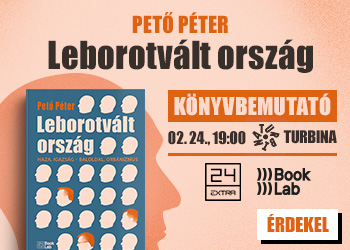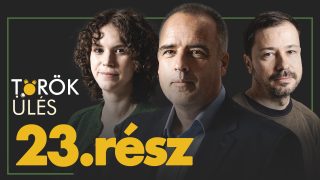Viktor Orbán and Fidesz approached the June 9 European parliamentary election with three main goals:
- conquering Brussels,
- stopping the pro-war advocates,
- and joining a new, larger European parliamentary faction.
Conquering Brussels
This goal was difficult to define from the get-go. Although the European Parliament is a co-legislator with the European Council, real power lies in the hands of the latter. We have written about this in detail earlier, but the main point is that Fidesz had no real chance to ‘conquer’ Brussels either with the newly acquired 11 or the previously held 13 seats.
In the power structure of the European Union, the real deciding factor is the composition of the European Council – comprised of the European Union’s heads of government, who were elected not all at once and not this June, either. The composition of the European Council did not change; the same majority remains that previously decided to freeze part of the funds allocated to Hungary.
Fidesz’s political slogan to „Conquer Brussels” might have referred to the idea that a solid performance in the EP elections may have given Fidesz greater authority to influence Europe’s daily affairs. It was more of a domestic political campaign slogan aimed at encouraging their own voters to participate.
Stopping the pro-war advocates
The pro-war vs. pro-peace dichotomy is Viktor Orbán’s own invention – it’s not a political reality.
To truly capture this dichotomy, one needs to unravel what the parties mean by it. Fidesz understands pro-peace as an immediate – albeit not very precisely defined – ceasefire and the end of the war. This scenario would mean satisfying Russia’s interests more than those of true peace. The political forces that Fidesz labels pro-war instead strive to achieve a Ukrainian victory through further aid to Hungary’s eastern neighbour. As the aggressor in the conflict is Russia, and of the two adversaries it’s only Russia that has troops on the other’s territory, stopping the war is also within Russia’s capability.
The forces Orbán calls pro-peace do not believe in this version of peace, but rather that
- Ukraine should accept Russian aggression and the loss of its territories,
- and that the European Union should stop sending weapons and support to Ukraine, effectively disarming Ukraine’s capacities to withstand Russian aggression.
There is indeed debate about the extent of support provided to Ukraine, but there is no conflict between pro-peace and pro-war factions.

Joining a new European party family
Fidesz has not found a new parliamentary faction since it had left the European People’s Party to avoid expulsion. Tensions had been long building up, but it was forcing the Central European University out of Hungary that ultimately soured the relationship with the centre-right bloc. The connection was not entirely severed, however, as the EPP would still continue to tolerate KDNP’s (KDNP is Fidesz’s nominal coalition partner and satellite party) one single representative among its ranks. However, Zsolt Semjén announced shortly after the elections that KDNP would leave the EPP as they find the membership of Péter Magyar and his Tisza Party morally unacceptable.
Since 2021, Fidesz’s representatives have been working as independents in the European Parliament. This means significantly less money and influence on Europe’s daily affairs.
Currently, there are two potential party families that Fidesz could join. Orbán has stated recently that their primary choice would be to join the Atlanticist and anti-Russian, but Eurosceptic European Conservatives and Reformists (ECR) faction. The other option is Identity and Democracy (ID), situated even further to the right. ID is the collective of far-right, pro-Russian and populist forces. The faction has been facing significant rejection in the EP so far, with majority parties unwilling to cooperate with them.
Orbán has spoken openly about this, while von der Leyen was depicted alongside George Soros’ son – in a not at all positive light – on Fidesz’s campaign billboards.
A failed conquest
The results of the European parliamentary elections are clear:
Throughout most of its history, the European Parliament has been largely controlled by two large party families: the EPP and the Social Democrats. This division between right- and left-wing parties determined everything that happened in Europe. Until the 2019 EP election, these two factions had a majority and did not need additional allies.
The slow weakening of these two major families is the story of recent decades’ European politics. Things finally changed with the 2019 EP election, when the two major families would also need the alliance of the liberal faction Renew Europe, previously known as ALDE. This faction rose to prominence in 2019 with the addition of French President Emmanuel Macron’s new party. These three parties currently hold a majority in the parliament, although it is smaller than in the previous term. Macron’s dismal performance in the EP elections has weakened the liberals, but the People’s Party (EPP) has managed to gain strength. If there is a real winner of this election, it is the EPP: it gained enormous political legitimacy, while Macron, the most frequent challenger of EPP dominance, weakened.
In this cycle, Fidesz will send two fewer representatives to the European Parliament. Still, the 11-member delegation is not small, quite the contrary.
Fidesz has exerted itself in the election, yet the end result is fewer EP representatives. Not to mention that for the first time ever, a real challenger – Péter Magyar’s Tisza Party, aiming to join the EPP – has come within striking distance.
No Pro-Russian breakthrough
Among the most successful parties in the EP election, three belong to the group that Viktor Orbán would call pro-peace: these parties are indeed more lenient towards Russia. In Austria, the Freedom Party won the election, as did Marine Le Pen’s National Rally in France. Germany’s far-right AfD had its best performance in history, becoming a significant force in East Germany, alongside the far-left. However, the AfD still performed worse than previously expected. They dropped nearly ten percentage points compared to surveys from a few months ago, while German politics clearly remains dominated by the Christian democratic right.

What could have caused a real change in the attitude towards Ukraine was the then-potential end of the current EP majority or a significant change in the composition of the Council, which has the true power to decide the extent of provided support. Neither of these happened; and although the currently recovering Robert Fico could have been a significant pro-Russian factor in the Council, the Slovak Prime Minister had so far voted in favour of every aid package despite opposing them in his communication.
Difficulties Finding a Party Family
At this point, it is not yet clear how Fidesz will be able to find a party family. Although Viktor Orbán wants to join the ECR faction, this will not happen without changing the fundamental political directions of the Fidesz government.
The faction also includes several small parties with personal conflicts with Fidesz. One such force is the current Czech ruling party, as it was their rival, Andrej Babiš’ ANO – currently in the liberal EP faction – that enjoyed Orbán’s support. Similar conflicts exist with the Swedish and Finnish Eurosceptic parties, which resented Hungary’s obstructionism around NATO accession. Another obstacle is Romania’s anti-Hungarian AUR, which wants to join the faction with five representatives. A while back, rumours suggested that Meloni had asked Orbán to normalise relations with Ukrainian President Volodymyr Zelensky in exchange for membership – so far, there are no signs of that happening. As long as this remains the case, Fidesz will have no chance of joining.
What Orbán hopes is that the ECR and the ID might unite, potentially creating the EP’s second-largest party family. However, this is rather unlikely. Significant tensions exist between the two factions, even beyond their differences regarding Russia. Several member parties are each other’s rivals within their respective domestic political arenas, while Meloni aims to become a defining force in the centre of European politics – the widely despised ID faction would only hinder such ambitions.
The main obstacle to Fidesz joining the ID faction was the German AfD, as the proximity to this far-right party would permanently sever the already weak ties with the traditional German right. If the AfD is unable to rejoin the ID, some rumours predict the formation of a new “hooligan faction” within the EP, named Vera Europa (meaning True Europe). Hungary’s far-right Mi Hazánk, maintaining good relations with the AfD, would also like to join this yet-to-exist faction. In any case, joining the ID would be much more acceptable for Fidesz if the AfD was not part of the family. Currently, without significant changes to their political directions, this is the only realistic chance of Fidesz finding a party family.
Von der Leyen seems increasingly certain
Regarding the European Union’s top positions, nothing is ever certain. However, after the current election, Ursula von der Leyen’s re-election seems more likely than before. The EPP and the German Christian Democrats, von der Leyen’s party family and party, respectively, are the real winners of this election. The French president, the main obstacle to von der Leyen’s re-election, has emerged as a clear loser, while the other opponent, Viktor Orbán, has also weakened. The four most important positions are now more clearly outlined than before:
- Ursula von der Leyen could be the President of the Commission,
- the Council could be headed by Portuguese socialist Antonio Costa (despite having resigned as Prime Minister last year due to a corruption scandal),
- Maltese EPP-politician Roberta Metsola might remain the President of the Parliament
- while the liberals’ Eastern European branch could get the position of High Representative for Foreign Affairs, with Estonian Prime Minister Kaja Kallas as the likely candidate.

Fidesz, on the other hand, could also benefit from von der Leyen’s smooth re-election. Orbán’s support for the current and potentially future President of the Commission could be – as we have reported earlier – the only opportunity to unfreeze Hungary’s funds and ensure Hungary isn’t permanently forced out of the Erasmus program. In other words, about one billion euros’ worth of funding is at stake. This could be sufficient motivation for the Prime Minister’s supportive vote.






